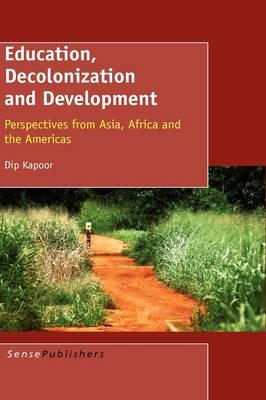Overview
Education, development and decolonization provides a historical, theoretical and practical inter-disciplinary analysis of the contemporary trajectory of colonization (including internal colonization) through the linked projects of eurocentric development, globalization and the uncritical adoption of colonial modes of education and learning in schools, communities, social movements and the progressive church in Asia, Africa and the Americas.
Full Product Details
Author: Dip Kapoor
Publisher: Sense Publishers
Imprint: Sense Publishers
Dimensions:
Width: 15.60cm
, Height: 0.80cm
, Length: 23.40cm
Weight: 0.191kg
ISBN: 9789087909246
ISBN 10: 9087909241
Pages: 140
Publication Date: 01 January 2009
Audience:
Professional and scholarly
,
Professional & Vocational
Format: Paperback
Publisher's Status: Active
Availability: In Print

This item will be ordered in for you from one of our suppliers. Upon receipt, we will promptly dispatch it out to you. For in store availability, please contact us.
Reviews
This book encapsulates a rare and complex dialogue about the radical potential of decolonizing epistemologies and educational practices anchored in the lives and struggles of indigenous communities in the Global South. An important and far reaching engagement with Euro-American, Marxist, postcolonial, and critical education theories of agency and collective praxis. Dip Kapoor and his colleagues pose theoretical and methodological questions about education, development, and decolonization in refreshingly smart and new ways. CHANDRA TALPADE MOHANTY, Chair, Department of Women's and Gender Studies Syracuse University, USA This book makes a major contribution to our understanding of the 'coloniality of power' as it has affected indigenous peoples in Asia, Africa and the Americas. First, Kapoor and his contributors break new intellectual ground in departing from stuffy and often times arid social science theory in developing novel approaches to analysing indigenous movements and issues that capture the complexity, contradictions and world views of the colonised. In this respect this collection of essays presents us with possibilities for reconceptualising its salient themes of Education, Decolonisation and Development from below, instead of from the lofty vantage points of the western social science canon. Second, these authors consistently remind us that we do not live in a post-colonial era - as some writers would have us believe-but that the 21st century is as much defined by colonialism/imperialism as were the 19th and 20th centuries. They also remind us, however, that neo-liberal globalisation (the hands off, contemporary version of colonial rule) has not gone unchallenged by indigenous communities. Rather, collective forms of indigenous resistance have emerged that have undermined colonial/imperial rule and which, in certain instances, have also generated counter-hegemonic alternatives from within the different contexts analysed in the book. As Kapoor and his collaborators show, these forms of resistance have assumed very different forms depending on their respective national, regional and local cultural contexts. Last, and perhaps most importantly, these essays contribute to the construction of a methodology of the margins that has the potential to give voice to those who have been silenced in history. In brief, this is a remarkable book that will become a standard text in courses on indigenous studies, the sociology/anthropology of development, international education and research methodology. STEVE JORDAN, CHAIR, DEPARTMENT OF INTEGRATED STUDIES IN EDUCATION, FACULTY OF EDUCATION, MCGILL UNIVERSITY, QUEBEC, CANADA
This book encapsulates a rare and complex dialogue about the radical potential of decolonizing epistemologies and educational practices anchored in the lives and struggles of indigenous communities in the Global South. An important and far reaching engagement with Euro-American, Marxist, postcolonial, and critical education theories of agency and collective praxis. Dip Kapoor and his colleagues pose theoretical and methodological questions about education, development, and decolonization in refreshingly smart and new ways. CHANDRA TALPADE MOHANTY, Chair, Department of Women's and Gender Studies Syracuse University, USA This book makes a major contribution to our understanding of the `coloniality of power' as it has affected indigenous peoples in Asia, Africa and the Americas. First, Kapoor and his contributors break new intellectual ground in departing from stuffy and often times arid social science theory in developing novel approaches to analysing indigenous movements and issues that capture the complexity, contradictions and world views of the colonised. In this respect this collection of essays presents us with possibilities for reconceptualising its salient themes of Education, Decolonisation and Development from below, instead of from the lofty vantage points of the western social science canon. Second, these authors consistently remind us that we do not live in a post-colonial era - as some writers would have us believe-but that the 21st century is as much defined by colonialism/imperialism as were the 19th and 20th centuries. They also remind us, however, that neo-liberal globalisation (the hands off, contemporary version of colonial rule) has not gone unchallenged by indigenous communities. Rather, collective forms of indigenous resistance have emerged that have undermined colonial/imperial rule and which, in certain instances, have also generated counter-hegemonic alternatives from within the different contexts analysed in the book. As Kapoor and his collaborators show, these forms of resistance have assumed very different forms depending on their respective national, regional and local cultural contexts. Last, and perhaps most importantly, these essays contribute to the construction of a methodology of the margins that has the potential to give voice to those who have been silenced in history. In brief, this is a remarkable book that will become a standard text in courses on indigenous studies, the sociology/anthropology of development, international education and research methodology. STEVE JORDAN, CHAIR, DEPARTMENT OF INTEGRATED STUDIES IN EDUCATION, FACULTY OF EDUCATION, MCGILL UNIVERSITY, QUEBEC, CANADA



